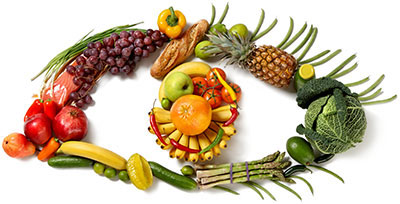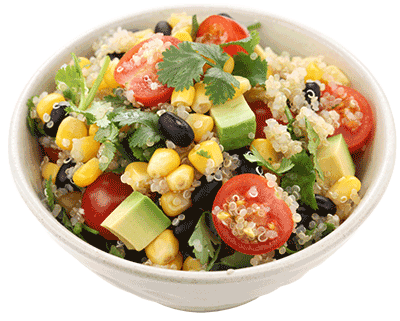Myths of Vegetarian & Vegan Diets
 When it comes to being a vegetarian or vegan, there are many myths that have become commonplace that stem from confusion about these diets. Some of these myths are reasons why people avoid becoming a vegetarian altogether, which is a shame.
When it comes to being a vegetarian or vegan, there are many myths that have become commonplace that stem from confusion about these diets. Some of these myths are reasons why people avoid becoming a vegetarian altogether, which is a shame.
Let's open our eyes and clear up some of the most common misconceptions:
MYTH: Protein only comes from animal products...
Protein is made up of two kinds of amino acids, which are the building blocks of protein:
- Essential amino acids (we get these from the food we eat)
- Non-essential amino acids (our body can make these)

A food that is called a "complete protein" contains all 9 of the essential amino acids and is considered a superior protein source (there are many plant food examples, including quinoa, amaranth, buckwheat, hempseed, and chia).
Yes, animal products do contain protein, but not all protein is alike. Many plant foods are very high in amino acid content that is very easily assimilated by the body. Digesting animal foods is a longer digestive process, requiring more energy from the body.
How Cooking Affects Protein
The next time you cook a piece of meat and revel in the amount of protein it provides to you, think again. The protein has been significantly degraded. Cooking proteins (whether plant or animal) at high temperatures makes them much more difficult for the body to digest because:
- The enzymes that help us predigest the protein have been destroyed by the cooking process. ...learn more
- Amino acids begin to deteriorate at 118° and most are destroyed at 160°.
When this damaged protein is eaten, it causes inflammation in the body. The exception is for certain legumes and vegetables that become more digestible when cooked.
 Learn more about why a lack of food enzymes affects
Learn more about why a lack of food enzymes affects the health of our pancreas, brain, and other organs:
The Body Healer Protocol...
Plant-based Protein Sources
There are many!
- Whole grains (bulgar, quinoa, millet, hemp, barley, oats, and amaranth are examples of wonderful grains that provide protein - hemp is considered a complete protein).
- Vegetables (especially leafy greens such as spinach, kale, collard greens, Swiss chard, bok choy, lettuce, and watercress).
- Legumes (beans and lentils contain a more complete set of amino acids than many other plant foods, although they can be more difficult to digest - soaking them overnight, adding vinegar, and skimming off the foam improves their digestibility).
- Seitan (made from wheat gluten, seitan is another source of protein, but because it is pure gluten, it is not for gluten-sensitive individuals).
- Nuts & nut milks (generally considered a fat rather than a protein, however peanuts are actually legumes and are far higher in protein than any other nut).
- Nori, a popular sea vegetable is high in protein content.
- Fruits average up to 4% protein.
It is interesting to note that that breast milk, the high-quality protein needed for babies when they are growing at a tremendous rate, contains only 4% protein - which is coincidentally the average amount of protein contained in fruits and vegetables. No one questions the power and strength of the gorilla, hippo, buffalo, or bull, who only eat a plant-based diet and certainly do not lack strength from a "protein deficiency."
Our body functions very efficiently with 5%-10% protein. It does not need any more. In fact, there are many studies that show a greater risk of disease correlates with very high dietary protein intake (especially, the cooked and highly processed powdery kind in protein shakes). These diets only serve to contribute to higher acidity in the body.
The only reason vegetarians feel like they need to eat large amounts of protein bars and drink protein shakes to "get enough protein" is because of very savvy advertising media campaigns developed by the supplement industry. Artificial protein supplementation is a multi-billion dollar business, with heavy targeting toward specific groups such as bodybuilders, dieters, and vegetarians. There is nothing healthy about highly processed protein supplements.
MYTH: Vegan & vegetarian diets are too difficult to stick to...
Discipline is involved in removing the unhealthy junk and lifestyle habits - things I call the Dirty Dozen. This includes highly refined and processed foods (including many frozen dinners), sodas, candy, pastries, fried foods, GMOs, irradiated foods, fast foods, and foods filled with toxic chemicals that over time we have become addicted to. It also includes chronic stress.
These are the changes that can be challenging to adjust to. Once we clean up our eating habits, removing animal products is a piece of cake...!
MYTH: Vegetarian & vegan diets are boring & unexciting...
Many vegans and vegetarians have a much more diverse diet than they did as a meat-eater because they learn to create new tastes and flavors and food combinations. They are open to more foods and new ideas about food preparation and eating.
MYTH: Vegetarians & vegans are weak & lack strength...
Dr. Dean Ornish, MD, on |
The amazing health benefits of raw foods...
Healing chronic disease with raw foods...
Vegetarian & Vegan Athletes
Thankfully, many vegan and vegetarian athletes today are finally debunking the myth that successful athletes cannot be vegetarian or vegan. Not only do they compete in sports, they also win Olympics and world championships.
Many vegetarian and vegan athletes have said they
compete at a higher level since giving up animal products
Let's take a look at some of these athletes:
- Murray Rose (Australia), 3-time gold medalist in swimming, with 1 world record.
- Peter Hussing (Germany), 1979 European amateur boxing champion, super heavyweight class.
- Andreas Cahling (Sweden), 1980 Mr. International body building champion.
- Fiona Oaks (UK), won 17 UK titles as a cyclist, represented the UK in the 1992 Barcelona Olympics. Essex County marathon champion, beating the record by over 11 mins. Oaks achieved top 10 places in Florence and Amsterdam. Not only is Oaks a vegan, she has also undergone a knee replacement.
- Toni lnnauer (Austria), 1980 Olympic gold medalist in the ski jump.
- Ingra Manecke (Germany), champion discus thrower from 1977 to 1982.
- Chris Evert (USA), world-class tennis champion in the 80's.
- Brendan Brazier (Canada), professional ironman triathlete, best-selling author on performance nutrition, 2-time Canadian 50km ultra marathon champion, holder of the 2003 and 2006 national 50km ultra-marathon championships, 3rd place at the national long-course triathlon championships, and both 3rd and 2nd place winner in the royal Victoria marathon.
- Martina Navratilova (USA), world-class tennis champion: "Eating whole foods and plant-based foods and juicing are my main diet choices. I believe that vegetarian protein is important, and should complement a meal that is plant-based, with fresh veggies, whole grains, and fruits."
- Dave Scott (USA), one of the greatest triathletes in the world, 4-time winner of the legendary Haways ironman triathlon.
- Edwin Moses (USA), world record holder, Olympic champion 400 m hurdles, went 8 years without losing a race.
- Jane Black (Canada), former weightlifter who has won her class, and received best lifter trophy for her age group at the masters world weightlifting championships in Canada in 1996. Set multiple weightlifting records in masters national and world.
- Carl Lewis (USA), vegan athlete and winner of 10 Olympic medals (9 gold) & 10 world championship medals. Lewis also topped the world rankings in the 100m and 200m and long jump events, was named Athlete of the Year in 1982, 1983, and 1984. Has set world records in relays. Voted Sportsman of the Century by the International Olympic Committee, and named Olympian of the Century by Sports Illustrated.
- Chris Campbell (USA), 4-time world champion wrestler.
I think we can all agree that these athletes are not "weak," nor do they lack "muscular strength"...
MYTH: Eating out as a vegan is almost impossible...
Let's take a look at how to adjust to some of the challenges:
The Eating Out Factor
These days, it is very easy to order a vegetarian meal at most restaurants (and pretty much all chefs are more than willing to make substitutions of vegetarian items such as vegetables, grains, or avocados in the place of meat). Eating out is more difficult for vegans and can severely limit menu choices (especially if the restaurant pre-prepares meals). Not living in a vegetarian/vegan-friendly community can also make eating out difficult.
One of the easiest way to handle the challenge of eating out if you are a vegan is to order a large salad, and a side of veggies or grains. Choose an oil & vinegar dressing (or lemon wedges), and request that any the veggies be steamed and prepared without butter or other dairy items. Most dessert menus offer fruit options, which are far healthier than the usual high fat, high sugar desserts. Luckily, more and more restaurants are beginning to accommodate requests to "veganize" certain vegetable-based dishes. The ones that won't are simply avoided. Some now even offer vegetarian and vegan menu sections, or use icons next to meals that are vegetarian and vegan friendly.
If you are attending an event like a baseball game, it is a good idea to bring some healthy snacks along with you. This is true regardless of whether you are a vegetarian, vegan, or meat eater and simply want to eat healthier foods, because it is very difficult to find healthy choices at most of these events.
The Social Changes Factor
This becomes a typical and often unintended consequence. The more we remove animal products from our diet and pay attention to food labels, the more health conscious we become. The more health conscious we become, the more we tend to leave behind other habits such as eating at restaurants that are not the healthiest, smoking, alcohol, and drugs.
All these habits are a very common part of social gatherings, and many vegetarians and vegans find that they unintentionally begin to gravitate towards company that share their new feelings about health, and who eat similar foods. New friends come into the picture, and we become a part of different types of social gatherings.
Being A Dinner Guest
When invited to parties, dinners, and other similar social gatherings, many vegans and vegetarians are concerned about inconveniencing their host, or people rolling their eyes at having to accommodating them. But usually, the opposite is true. The most common reaction to vegans and vegetarians is a willingness to accommodate with salads, vegetables, fruits, and grain-based dishes, and a simple concern by the host that they are providing something you will like. Many hosts see this as a great reason to have healthier food choices available for everyone (including themselves!).
A smart way to approach this is by offering to bring an exciting, fun, and tasty dish, which let's you share the food you love with others. Your host will greatly appreciate the gesture because they will be interested to know the kinds of foods you can eat (as well as being grateful for the dish)! They are often shocked at how tasty vegan dishes can be - very unlike the bland dish they imagined.
The Bottom Line
Sometimes, being a vegetarian or vegan means dealing with other people's negative perceptions, especially those who are not so accepting of vegetarian and vegan diets and who have preconceived (and often incorrect) notions about these diets.
If you approach your eating choices from an educated perspective, the easiest way to talk with others is to politely answer their questions and help educate them on the points they are confused about. Most non-vegetarians are completely unaware of how serious the devastating environmental impact of factory farming is, the cruelty involved, and how eating factory-farmed meat is damaging to their health. Sharing this information with them can help open their eyes to something they are unknowingly contributing to.
Why you should avoid factory-farmed meat...
If they are not interested in learning about your dietary preference or hearing your viewpoint, then simply refrain from discussing your eating choices with them. Never take the "I'm right, you're wrong" approach that some choose, and force your opinion on others. It will only serve to make you unpopular and dogmatic.



